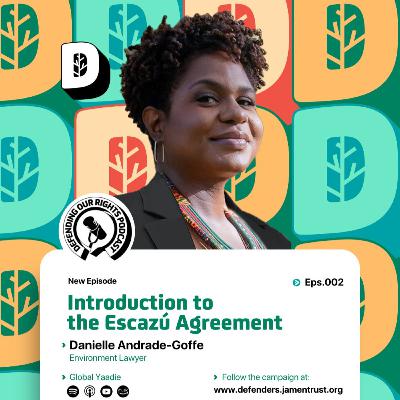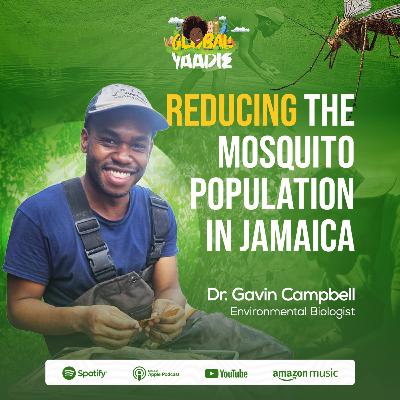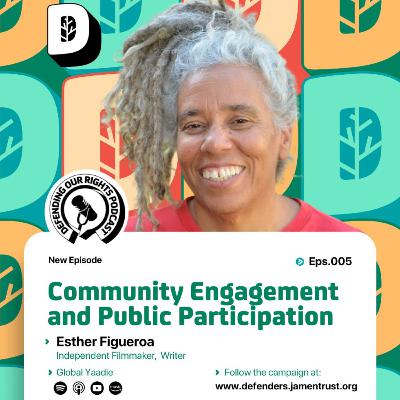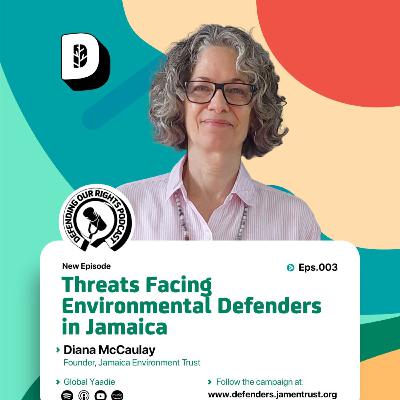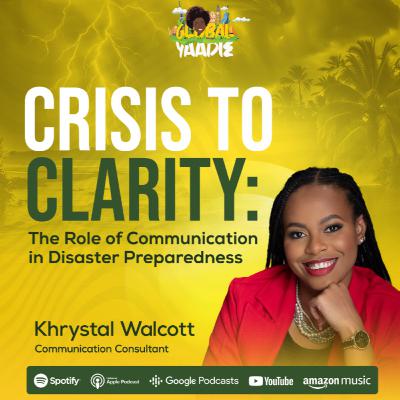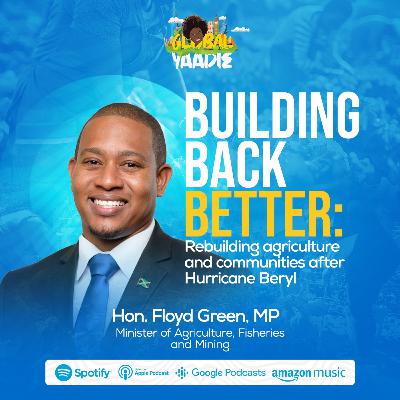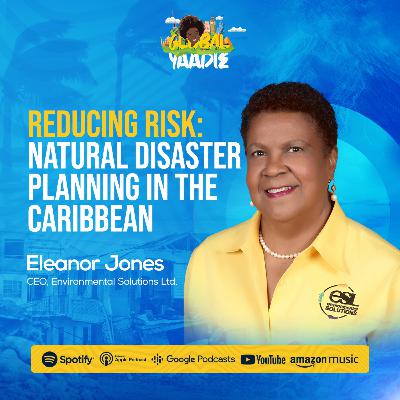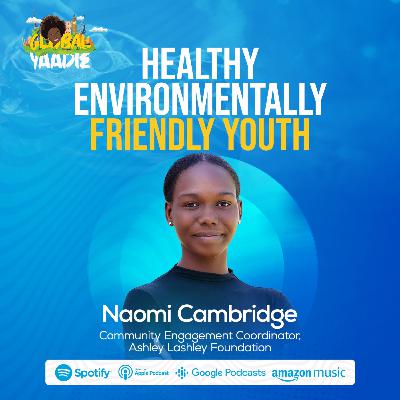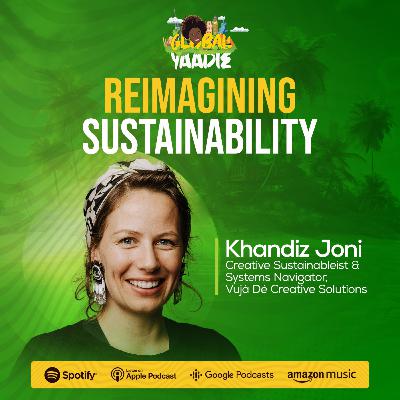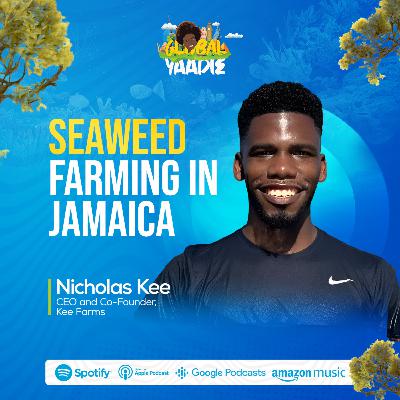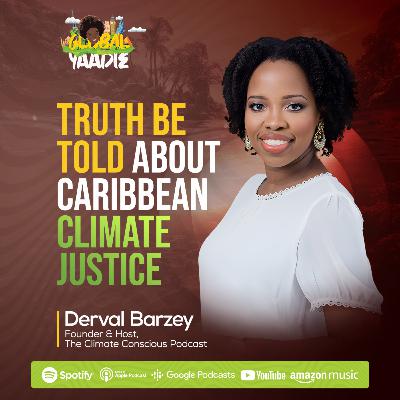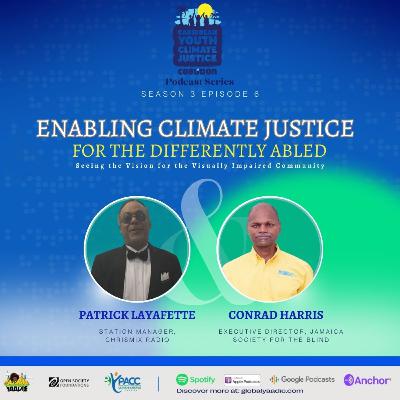Discover Global Yaadie
Global Yaadie

Global Yaadie
Author: Global Yaadie
Subscribed: 7Played: 166Subscribe
Share
© Global Yaadie
Description
The Global Yaadie podcast is captures colourful and powerful voices on climate change and sustainable development. We amplify the experiences Caribbean and international guests, connecting audiences across the globe.
66 Episodes
Reverse
Environment lawyer Danielle Andrade-Goffe takes us beyond the basics of the Escazú Agreement to explore the legal and cultural realities shaping environmental justice in Jamaica. From the gaps in meaningful public consultation to the limited legal safeguards for environmental defenders, Danielle breaks down why implementation, not just ratification, matters. She explains why protecting Jamaica’s environment isn’t just about policy but about people. She breaks down how the Escazú Agreement could help everyday Jamaicans get better access to information, speak up in decisions that affect their communities, and hold leaders accountable.The episode shows how law, policy and public voice can come together to shape Jamaica’s environmental future.The views expressed in this video are those of the guest and do not necessarily reflect those of the Jamaica Environment Trust and Global Yaadie.Connect with the Defending Our Rights: Environmental Justice in Jamaica Campaign! Visit - https://defenders.jamentrust.org/Follow - https://www.instagram.com/defendersja/Episodes also available at - https://creators.spotify.com/pod/profile/global-yaadie/
Dr. Gavin Campbell shares fascinating insights into his research on back swimmers, aquatic insects with the potential to help control mosquito populations in Jamaica. The conversation explores the delicate ecological balance between mosquitoes and their natural predators, the impact of climate change on these relationships, and the broader implications for public health.Dr. Campbell discusses the feeding habits of back swimmers, their habitat needs, and the challenges of relying solely on biological control methods. He also highlights the resilience of mosquito populations and the importance of using integrated approaches for effective mosquito management. As research in this area continues to grow, the episode underscores the need to better understand the ecological value of insects and their role in sustainable solutions to public health concerns.TakeawaysBack swimmers can consume up to 118 mosquito larvae per day.The effectiveness of back swimmers is limited by their habitat requirements.Mosquito populations are resilient and can adapt to environmental changes.Climate change poses a significant threat to the balance between mosquitoes and their predators.Biological control methods need to be integrated with other strategies for effective mosquito management.Community engagement is crucial for implementing effective mosquito control measures.Understanding the ecological roles of insects can lead to better conservation efforts.
Marine scientist Dr. Dayne Buddo discusses the significance of the high seas and the Biodiversity Beyond National Jurisdiction (BBNJ) Treaty. This episode explores the environmental and economic implications of the high seasfor the Caribbean, the importance of biodiversity, the challenges posed by climate change, and the need for regional collaboration to protect marine resources. The conversation emphasizes the interconnectedness of ocean health,climate stability, and community livelihoods, highlighting the urgent need for sustainable practices and policies.TakeawaysThe high seas cover two-thirdsof the ocean and are crucial for climate regulation.Biodiversity is essential forthe health of marine ecosystems and human survival.The BBNJ Treaty aims to protect areas beyond national jurisdiction.Marine protected areas can help replenish marine resources.Climate change significantly impacts ocean health and weather patterns.Collaboration among Caribbean nations is vital for effective ocean governance.Economic opportunities exist in sustainable marine biotechnology and fisheries.Local communities must engage in ocean conservation efforts.The health of the ocean directly affects tourism and food security.Protecting the high seas is essential for future generations.To learn more visit the https://highseasalliance.org/
Environmental defenders face steep challenges, from limited access to information and justice to being excluded from decisions that affect their communities. Filmmaker and activist Dr. Esther Figueroa shares how storytelling can cut through these barriers, inspiring action and building awareness around environmental rights.The conversation explores the transformative potential of the Escazú Agreement, a regional treaty that guarantees public access to information, participation in decision-making, and stronger protections for environmental defenders. Dr. Figueroa reflects on why community engagement is essential for lasting change and how art can empower everyday people to join the fight for a healthier, more just future.The views expressed in this video are those of the guest and do not necessarily reflect those of the Jamaica Environment Trust.Connect with the Defending Our Rights: Environmental Justice in Jamaica Campaign! Visit - https://defenders.jamentrust.org/Follow - https://www.instagram.com/defendersja/Episodes also available at - https://creators.spotify.com/pod/profile/global-yaadie/
Diana McCaulay, founder of the Jamaica Environment Trust, shares how she went from knowing little about environmental issues to leading one of Jamaica’s most recognized advocacy groups for over 30 years. Drawing on her decades of experience, she reflects on the risks faced by environmental defenders, the barriers they encounter in accessing information and justice and why public participation is critical to protecting Jamaica’s natural resources. The conversation also explores the Escazú Agreement and how it could transform support and protections for those on the frontlines of environmental justice.The views expressed in this video are those of the guest and do not necessarily reflect those of the Jamaica Environment Trust.Connect with the Defending Our Rights: Environmental Justice in Jamaica Campaign! Visit - https://defenders.jamentrust.org/Follow - https://www.instagram.com/defendersja/Episodes also available at - https://creators.spotify.com/pod/profile/global-yaadie/
In this episode of the Global Yaadie podcast, Communication Consultant Khrystal Walcott sheds light on the vital role of clear and timely communication in preparing communities for the realities of climate change and natural disasters. She discusses how recent hurricanes in the Caribbean highlight the need for effective communication strategies that keep people informed and resilient. Khrystal also shares insights on tailoring messages for different audiences, including the importance of community-based organizations, gender and disability considerations, and how technology and digital media can enhance disaster preparedness efforts. This episode emphasizes communication as a key tool for building stronger, more informed communities.
In this episode of the Global Yaadie Podcast, Jamaica's Minister of Agriculture, Fisheries, and Mining, Honorable Floyd Green, provides an insightful look into the aftermath of Hurricane Beryl and its impact on the agriculture and
fisheries sectors in Jamaica and the Caribbean. With an estimated J$10 billion required to rebuild the farming and fisheries sector, the ripple effects are being felt by over 48,000 farmers and 11,000 fishers. Beyond the numbers,
Minister Green highlights the collective effort needed to rebuild, emphasizing the power of community support and the pivotal role the diaspora plays in recovery efforts. The conversation also emphasizes the importance of climate
resilience and climate finance for small island developing states to better withstand the impacts of climate change and future disasters. Beryl is behind us but the work continues.
Tune in for practical insights to support affected communities and help people to recover.
Managing environmental risks requires proactive strategies and a commitment to both individual and collective action.
As part of a World Environment Week reflection and the start of the Atlantic Hurricane Season, host Dainalyn Swaby discusses environmental risk management with Eleanor Jones, CEO of Environmental Solutions Ltd (ESL). They explore the importance of understanding natural systems and reducing vulnerability to extreme events especially in the Caribbean. Eleanor discusses the difference between preparedness, relief, and recovery, and the need for pre-disaster planning. They highlight the importance of community involvement, communication, and inclusivity in disaster planning.
The environmental risk management expert emphasizes the need for continuity planning in sectors such as tourism and agriculture, and the importance of building resilience and reducing environmental impact.
Tune in for insights on individual and collective responsibility in managing environmental risk.
Connect with ESL
Terrestrial Biologist and Wildlife Expert, Damion 'Rooster' Whyte, explains the impact of climate change Jamaica's wildlife. Damion's social media has grown into a huge citizen science platform and its changing local attitude towards animals and nature. The episode explores the effects of climate change on different species, local challenges with invasive species and the return of a rare, centuries-old Galliwasp specimen to Jamaica.
The conversation explores both helpful and harmful sides of human behavior on local ecosystems. Learn more about this Jamaican scientist harnessing the power of the public in environmental conservation.
In this episode Naomi Cambridge, Community Engagement Coordinator for the Ashley Lashley Foundation, shares their impactful work to build a movement of Healthy Environment-Friendly Youth – HEY, the flagship campaign active in over 50 countries worldwide and other engagement & empowerment initiatives. This episode delves into the vital intersection of climate change and health, shedding light on how climate impacts affect mental, respiratory, and cardiovascular health, and how rising temperatures are changing the work landscape in the Caribbean.
Naomi highlights the foundation's efforts to align climate action with the relatable interests of Caribbean youth. On the mission for meaningful youth engagement, the organization is one of the lead youth stakeholders in the upcoming SIDS Global Youth Climate Action Summit in Antigua & Barbuda May 27-30, which aims for inclusive representation from Caribbean and Asia Pacific youth. Tune in to learn about the foundation's local actions makinga global impact, and the transformative power of young people on the frontlines of climate action for the Caribbean region.
Discover The Ashley Lashley Foundation
Creative Sustainableist and Systems Navigator, Khandiz Joni delves into the intersection of sustainability and creativity. She introduces her innovative Regenasyst methodology, which reframes sustainability through a lens of creativity and imagination. Khandiz shares her career journey, blending her background as an artist with her passion for sustainability. Discover practical advice for businesses looking to integrate sustainability into their core practices and the importance of focusing on specific areas for impactful change. Amidst discussions surrounding the challenges of achieving net zero and the necessity of practical solutions for business resilience, Khandiz advocates for a holistic approach to sustainability. By considering the interconnectedness of biodiversity, consumption patterns, and community well-being, we uncover pathways towards a more sustainable futureCo-create with Khandiz at https://vujadecreative.solutions/
CEO and Co-Founder of Kee Farms, Nicholas Kee discusses his
transition from running a tech non-profit to diving into seaweed farming in Jamaica. From sea moss to
sargassum, explore the diverse uses of seaweed in food, beverages, biotech and
its larger role in the Caribbean blue economy. Nicholas shares how Kee Farms navigates challenges in scaling production, engaging
fisherfolk while addressing the crucial need for local support and funding.
Learn how data and policy considerations shape the future of the blue economy
and the potential of carbon credits. With insights on government backing and
public perception, this episode highlights local efforts to boost sustainable mariculture and a thriving
Caribbean blue ecosystem.
Discover Kee Farms
Visit Global Yaadie website
Listen Global Yaadie on: Spotify, Apple , Google , Pocket Cast , Cast Box
Follow Global Yaadie on : Instagram , Facebook , Twitter , LinkedIN
In this 3-peat pod to pod, Derval Barzey, founder of The Climate Conscious Podcast, joins Global Yaadie to discuss her journey and pivotal work in sustainability. They explore the evolution of The Climate Conscious Podcast and the advocacy campaigns launched through the platform.Derval delves into the Caribbean Women for Climate Justice Series and the Truth Be Told campaign which tackled the intersection of climate, gender justice and other social issues. The climate podcast hosts discuss the growth and impact of the Caribbean podcasting sector and the power of partnerships in building a resilient and sustainable future.
Highlighting growth, connection, and gratitude, this episode is a testament to the limitless potential of podcasting to inspire action and drive change.
Connect with The Climate Conscious
Visit Global Yaadie website
Listen Global Yaadie on: Spotify, Apple , Google , Pocket Cast , Cast Box
Follow Global Yaadie on : Instagram , Facebook , Twitter , LinkedIN
In Global Yaadie's first in-person recording, we sit down with Esirom Foundation's Sustainability Coordinator, Khalia Hall inside Esirom Studios, Jamaica. We explore how Esirom is redefining sustainability efforts making environment action sexy, do-able and impactful for all Jamaicans. Khalia shares some of the exciting initiatives and campaigns such as the Kingston Harbour Project, National Park Week and Bring You Owna Tings (Bring Your Own Things) - endeavors aimed at inspiring sustainable lifestyle choices across Jamaica.Special thanks to Esirom for the making Global Yaadie "guest on set"!
Indigenous peoples are the world’s first eco-warriors, through their way of life, they are protectors and preservers of our natural environment. In the Caribbean, indigenous groups are fighting for land rights, the protection of natural resources, the continuity of their culture and resilience to climate change. In this two-part episode we connect with indigenous communities in Suriname and Belize.
In part one, Sirito Yana Aloema, shares the experiences of his Kaliña tribe and how traditional knowledge, practices and livelihood are affected by climate change. Through the lens of the Galibi native, we explore the connection with climate change, culture and community life. We learn firsthand the threats to community development due to loss of culture and how the economic ambitions of outsiders are depleting natural resources. Yet in the face of economic, political and social challenges, the Kaliña remain resilient. The respect for nature, the caution for the overuse of resources and their desire for intergenerational equity proves conversations on climate justice should always centre indigenous people.
In the second part of our conversation with Ayesha Constable, co-founder GirlsCARE, Young People for Climate Action and our partner in this climate justice series, we continue to explore the powerful link between gender justice and climate justice in the Caribbean. In this thought provoking episode, Ayesha uncovers how women's empowerment and equality play a vital role in combating climate change impacts.
In our season finale we end with the one who started it. Ayesha Constable, founder of GirlsCARE, Young People for Climate Action and our partner in this climate justice series tackles issues of gender justice. In this hard hitting two-part series, we peel back the layers and intersectionalities between climate change and gender.
Ayesha provides scholarly and cultural insights into the barriers for gender justice for Caribbean women, the power dynamics in relation to climate leadership and decision making. There is a rising wave of women in the Caribbean climate space, yet the decisions are docked in the male domain. Using her regional and international experience, the scholar activist, feminist and gender expert shares needed approaches to drive transformative change and greater empowerment for Caribbean women and girls.
Being blind doesn’t mean you should be left behind, in conversations on climate justice and certainly not in cases of natural disasters. In this stirring interview, Radio station Manager, Patrick Layafette and Executive Director for Jamaica Society for the Blind, Conrad Harris challenge how we see the visually impaired community in relation to disaster risk reduction and social engagement.
We discuss social and economic factors that affect the blind community that filter into exclusion from climate action. The dynamic duo shows us how communities can also enhance resilience by identifying and including people with disabilities before an emergency or natural disaster.
The visually impaired community is often cut off from critical information. We explore the platforms and inclusive communication approaches that can drive awareness and facilitate greater participation from the differently abled group.
Malene Alleyene, Human Rights Lawyer and Founder of Freedom Imaginaries, enlightens us about human rights law as a tool for transformation. Through a social imaginary lens, she advocates that the protection and preservation of communities are connected to opportunities for marginalized people to create their own concept of harmonious living. In this episode, we explore a “rights based and earth centered approach” linked to the eradication of systems that are colonially rooted. We also discuss considerations for the creation of equitable systems to reduce disproportionate impacts of climate change.
We learn through Malene, to consider and contribute to the needs of Caribbean people that are not often reflected in the “mainstream human rights field”.
It’s a conversation that reinforces the notion that climate justice is about confronting structural issues and forms of oppression. A stimulating episode, we learn about pathways and tools to seek justice, how communities can be empowered to claim rights through advocacy. We also discuss the creation of safe spaces, justice networks and the leveraging of legal skills as some of the ways we can harness human rights to advocate for systemic change or as Malene puts it “a shared vision for living together”.
Dr. Ainka Granderson from the Caribbean Natural Resources Institute (CANARI) introduces the Caribbean Climate Justice Alliance (CCJA) which aims to transform policy and practice for climate action. This episode makes us appreciate that: 1) Governments are important but the groundwork even more so. 2) The roots of climate resilience are tied to local communities. 3) Civil society groups, academia, community-based organizations and youth groups are the indispensable heroes in the climate justice league.
Ainka outlines CANARI’s climate justice agenda which is to bring together organizations fighting for climate justice to achieve greater regional impact. The episode also gives insight into the practical approaches used by CANARI including the implementation of a monitoring and evaluation framework to track the progress of climate justice projects.
Using advocacy, action, learning and partnerships, CANARI aims to amplify the voices of vulnerable communities to champion climate justice in all forms.


